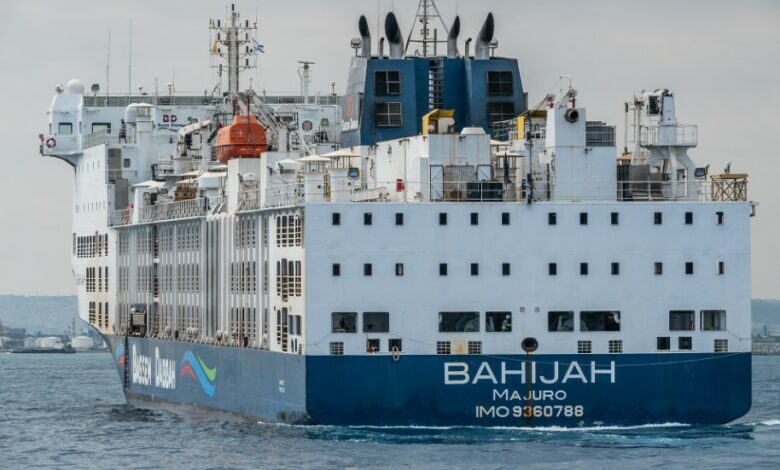Low mortality of unloaded cattle from problematic livestock carrier, fate of the rest still unknown

After nearly a month at sea and a few days in port, several hundred head of cattle from the Bahijah livestock carrier were unloaded on Friday night.
The unloading was done at the request of the exporter and officials from the Australian Department of Agriculture, Fisheries, and Forestry were present to ensure all biosecurity protocols were met. According to an update by the department, the cattle appear healthy.
After unloading, the cattle were moved to the appropriate premises where for safe quarantining. The department noted that this action was separate from the potential re-export of the remaining animals on the vessel, an action still under consideration.
Secretary of the Australian Department of Agriculture, Fisheries and Forestry Adam Fennessy said on Sunday that the veterinarian on board the vessel reported no significant health or welfare concerns with the livestock that remain on board the vessel.
“Veterinarians visited the livestock yesterday and the Australian Chief Veterinary Officer, Dr Beth Cookson, is in regular contact with the Western Australian Chief Veterinary Officer in respect of the livestock [that disembarked on Friday],” Fennessy stated.
No final decision has been made by department officials regarding the livestock still on the Bahijah. The department, according to Fennessy, is still assessing the application to re-export the livestock provided by the exporter as “a matter of priority.”
“Right now, the ship is currently off the West Australian coast and is undertaking some routine cleaning. It is adequately provisioned for the livestock on board,” he added.
When answering a question about the decision for re-export taking so long, the department secretary said that the legislation set out what the decision-maker must consider and be satisfied to approve an application for export.
“The legislative requirements have been met, including those in the Export Control Act and Animals Rules. [The] importing country requirements have been or will be met before the livestock are imported into the importing country, for example, if an import permit is required and has or will be obtained. Arrangements for the voyage are appropriate to ensure the health and welfare of the livestock,” Fennessy said.
Another question addressed to the department was a report that the unloaded animals would be processed in Victoria which the secretary denied.
The excellent health of the animals was opposed to local media reports which stated that some of the several hundred cattle unloaded from the Bahijah on Friday had also died over the weekend. Those deaths are now under investigation. Dr Cookson did not provide an exact number but said that the mortality rate was low.
The 2010-built, 7,900 dwt livestock carrier with around 14,000 sheep and 2,500 cattle, registered to Israeli-based Bassem Dabbah Shipping, had been on the water since January 5 when it left Australia. On January 16 it diverted from its route due to safety concerns from Houthi attacks on ships in the Red Sea. The Department of Agriculture ordered the vessel to immediately return to Australia due to biosecurity risks and livestock welfare.
The vessel was moored off the coast of Perth for several days before berthing in Fremantle port on early Thursday morning local time. The exporter did present a plan to resolve the issue to the Department of Agriculture. It entails offloading some of the animals in Western Australia and sending the rest back to the Middle East along the longer 33-day route along Africa. The vessel is currently being replenished with supplies and no animals are currently being unloaded.

 livestock carrier were unloaded on Friday night.
livestock carrier were unloaded on Friday night.
This whole despicable situation is cruel and unnecessary. Shame on the Australian authorities for continuing live export of animals. Have these animals not suffered enough?
Unbelievable to say the least, its an absolute discrace, 😡😡
Those animals are suffering minute by minute,
This is so ignorant to do that to those animals. Shipping livestock like that should be banned. That is cruely in spades. They are making it sound like those animals are doing ok. They have been under unimaginable stress. Anyone who knows animals knows that is the truth. Shame on everyone involved here.
Unbelievable! The Department of Agriculture should be ashamed of themselves. They ordered the ship back and should have had the paperwork in order for a quick turnaround. It took 10 days for them to arrive at port. Typical government tardiness!!
Appalling no consideration for these animals absolutely nothing. Disgraceful all involved. Transport by sea of any live annimals should be banned.
Shame on you Australia call yourself human. You’ve lost the respect of the whole world
Please unload ALL of these poor animals immediately. HAVEN’T THEY SUFFERED ENOUGH???????. What the hell are they thinking to send these poor things back out to sea for another 33 days without even getting off the ship from the first round of stress. This is all about MONEY and not at all about ANIMAL WELFARE. I only found out recently that all live animal exports are done so this way to fulfill the religious ways to slaughter them in the countries they are doomed for. Live animal exports should be banned immediately for all countries. SHAME ON ALL OF YOU INVOLVED in any live exports from any country. Makes me ashamed to be a human being. Anger doesn’t cover it.
Really